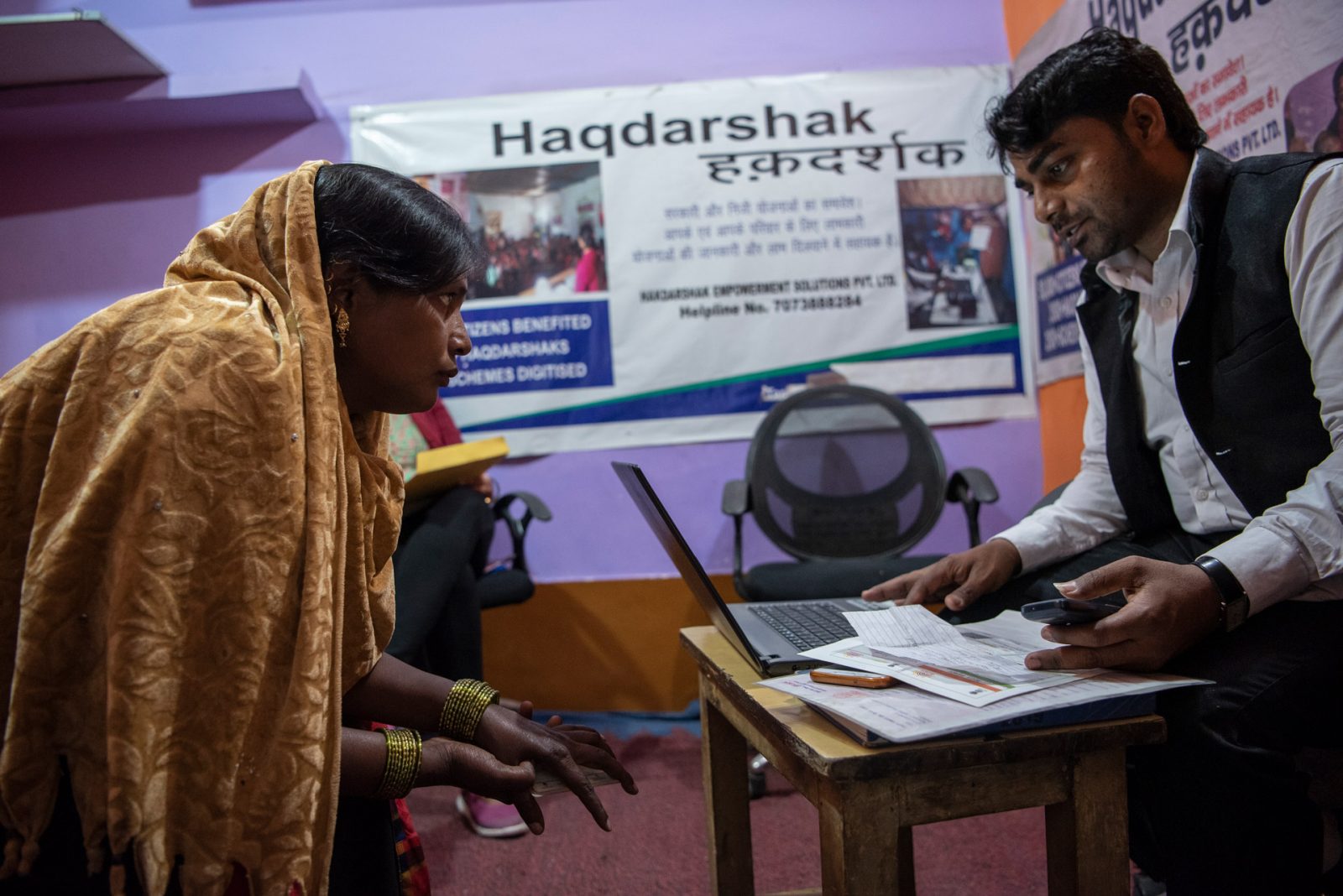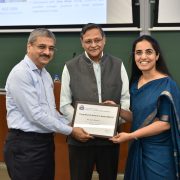By PR Ganapathy, PGP 93

Caption: A Haqdarshak team member helps a community member in Delhi, during an eligibility discovery program
Some months ago, our former maid Latha, called my wife. She was clearly scared when she described a lump she had discovered in her breast. An appointment for a biopsy had been scheduled, but she was troubled by the fact that she had no health coverage, and little savings to fall back on.
Like Latha, 297 million people live below the poverty line in India. They are often just one health crisis away from complete destitution. To help these citizens, the government designs and implements “schemes”, targeted to assist a specific group facing a specific problem. A subsidy to buy a water pump, an old age pension, or a scholarship for a girl child. Almost Rs. 9 lakh crores are allocated to these schemes each year.
However, in the average Indian state, there are almost 1,000 active schemes. Most citizens are unaware of these programs, are intimidated by the application process, or don’t have the right supporting documentation.
The idea for Haqdarshak, an initiative to address this problem, started in Ahmedabad in 2016, where I was spending a weekend as part of the Aspire Fellowship, under the guidance of Prof Pradip Khandwala, who was Director of IIMA when I was a student. At that time, I was on a second career, inspiring, funding and mentoring social entrepreneurs, as President of Villgro, a non-profit incubator of social enterprises.
The idea was simple: (a) digitise the eligibility criteria for government schemes; (b) create an app that allows a “Haqdarshika” to interview a citizen, asking them a set of basic questions (caste, income, occupation, family, etc.) (c) filter the list of schemes down to those the citizen is eligible for; (d) help them to apply for, and benefit from, the schemes they’re interested in; and (e) charge them a small facilitation fee to ensure the venture is financially sustainable.
Haqdarshak has many providential connections to IIMA. As I was thinking through the idea that same year, I received a link to apply for the “Innovate for Digital India Competition,” an incubator program funded by the Government of India and run by IIMA’s Centre for Innovation Incubation & Entrepreneurship (CIIE). I wrote up the idea and submitted my application, and we were selected on the condition that a Co-Founder be physically present for the program, which was to start in two months.

Caption: The Haqdarshak team
I put out a call for Co-founders on LinkedIn, sharing the vision for the enterprise and committing to provide the seed funding. Almost 53 people wrote in, all of them passionate about the cause and several with many years of relevant experience.
However, an email from a young former Teach for India Fellow, Aniket Doegar, caught my eye. Aniket had tried to implement a similar idea using a non-profit structure, in Delhi. Using pen-and-paper, he had helped a few thousand slum citizens get government benefits, before he ran out of money. Aniket was passionate about doing something in this field, and my vision of a tech-based solution and a social enterprise with a sustainable revenue model appealed to him. “I want to do this, Guns,” he said.
I was sold, and in 15 minutes we shook hands. Aniket moved to Pune and began building the app. He made rapid progress through that incubator program and in a few months, we began training our first batch of Haqdarshikas – field level workers who would go door-to-door and bridge the gap in accessing government schemes.
As we completed the 6-month program, we were confident that the venture had legs and it was time to secure funding. While I had committed a substantial portion of the funding, since a number of my IIMA classmates had been keen to join me in supporting social causes, I decided to pass the hat around. The response was instantaneous. Ravi Saxena and Ashish Goyal (IIMA 93), Ramesh Srinivasan (IIMA 94) and S Ramakrishnan (IIMC 93) signed up. Sandeep Raju (IIMB 97) was so excited that he offered to raise money from his circle of friends, a number of whom contributed. Mukund Santhanam, Manish Subramaniam, Meenakshi and Ramesh (all IIMA 93) came on board in subsequent rounds. Ravi spent a lot of time mentoring Aniket and took a seat on the board. Subsequently, The Acumen Fund led a round of funding in 2020 (alongwith Upaya, Beyond Capital, Deepak Mehta’s family office, and the HiiL Justice Fund), and this has helped the company to scale. An appearance on the TV show Shark Tank raised the profile of the company and helped raise an investment from the Sharks.

Caption: A Haqdarshak agent in Odisha talks to citizens during a door to door awareness drive.
“Ideas are cheap, execution is everything,” is something I tell all the budding entrepreneurs I work with. Aniket did a fantastic job of executing on the idea, building a team, expanding to many different states, and securing the support of donors like the Tata Trusts and Google. Along the way, we realised that the revenue model of charging citizens a service fee wasn’t working, but found that corporations loved the concept and paid us to serve their workers and communities around their facilities.
Haqdarshak today operates in 25 states, has trained almost 40,000 Haqdarshaks, and has helped more than 7 million citizens and 100,000 businesses get over Rs. 20,000 crores in benefits. We’ve launched a Yojana Card with Matercard and a Rupay Card with NSDL Payments Bank. Clients include Tata Power, L&T, JSW, Godrej, and foundations like the Ford Foundation, Bill & Melinda Gates Foundation and Edelgive. The company has over 250 employees, is profitable, and has received numerous awards. Aniket was recognized as “Social Entrepreneur of the Year” by the Bhartia Foundation and Schwab Foundation. When we invested in the company, we told Aniket that the only metrics that mattered to us were the number of citizens served, and the value of benefits delivered. He and his team have far exceeded our expectations in this regard.
When Latha called us, I asked our Bangalore team to help. They got on the job immediately, and a Haqdarshak enrolled Latha in a government health insurance scheme within 24 hours. Our team of Haqdarshaks are helping thousands of Lathas every day.
If this sounds like something your organisation would benefit from, we’d love to hear from you! We work with both CSR teams (to benefit the community) and HR teams (to benefit your employees). We can also work with suppliers in your value chain. Just drop my colleague Madhura Karnik a line at madhura@haqdarshak.com and she’ll be in touch.
PR Ganapathy lives in Chennai and currently mentors several social entrepreneurs. He was most recently the South Asia Regional Director of Stanford Seed. In addition to Haqdarshak, he also co-founded the Menterra social impact fund. He can be reached at guns@prganapathy.com



